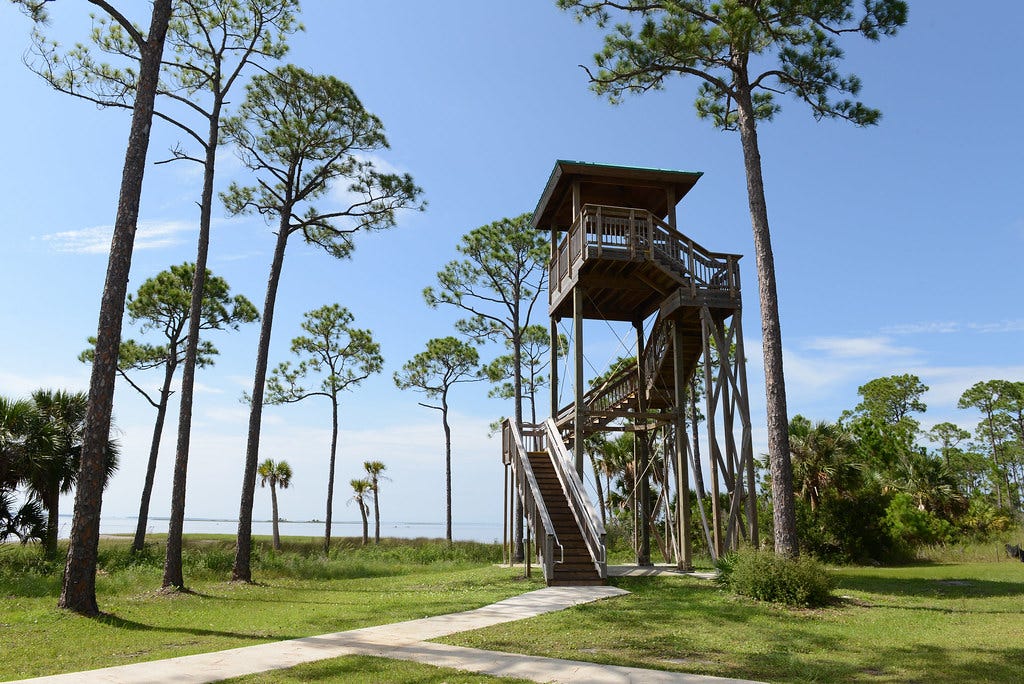
This is Seeking Rents, a newsletter devoted to producing original journalism — and lifting up the journalism of others — that examines the many ways that businesses influence public policy across Florida, written by Jason Garcia.
Jutting out into the Gulf of Mexico, on the far side of a sparsely populated peninsula about halfway between Tallahassee and Pensacola, Gulf County is one of the smallest and poorest pockets of Florida. The community’s meagre resources get stretched to the point of exhaustion during periods like holiday weekends and spring break, when a sudden rush of beach crowds can double or triple its population.
It costs a lot of money to pay for the police officers, lifeguards and ambulance medics needed to keep all those people safe. So local officials in Gulf County are asking the Florida Legislature for a bit of help.
It’s hard to imagine a more modest request: HB 673, which is sponsored by Gulf County Republican Rep. Jason Shoaf and would allow half a dozen very small, very poor counties along the Gulf of Mexico coast to spend up 10 percent of their hotel taxes paying for public-safety services used by tourists. The state already allows a handful of larger Panhandle counties to do this (a legacy of none other than Matt Gaetz).
Naturally, the tourism industry is trying to kill the bill – just like it has killed similar efforts over the years to let communities use a bit of their hotel taxes building affordable housing, cleaning polluted springs or protecting oceanfront areas from rising seas.
The public lobbying happens through the Florida Restaurant & Lodging Association, a group whose board is filled with lobbyists for companies like Disney and Universal – businesses that would prefer counties spend their hotel taxes advertising to tourists and subsidizing money-losing convention centers that help fill hotels with business travelers and comic-con fans.
The tourism industry often casts any attempt to spend money generated by the “tourist development tax” on local needs as a violation of some sort of sacrosanct pact that tourism leaders once made with the Legislature in which the industry agreed to tax itself in order to generate communal money for marketing.
This is Disney-like nostalgic fiction. The tourist tax exists because a bunch of businessmen in Daytona Beach wanted to build a convention center in the 1970s but knew that asking locals to pay for it could be politically toxic. Then one of those businessmen became speaker of the Florida House and muscled a bill through the Legislature to pay for convention centers by taxing tourists.
There are some flickers of pushback. HB 673 passed the House’s Tourism, Infrastructure & Energy Subcommittee this week by a 16-2 vote (though only after the original bill was significantly narrowed down).
“It’s called the tourist development tax,” said Randy Fine, a Republican from Brevard County. “Developing tourism means many things. And while we do have to make sure there’s adequate money for advertising, I do think there are other things that are involved in developing tourism.”
Fine has a unique perspective on this. Like Matt Gaetz a few years before him, Fine is one of the few legislators who has successfully shepherded a bill through the Legislature expanding the use of the hotel tax. In Fine’s case, it was a bill to let counties spend the money on infrastructure needs.
But also like Gaetz, Fine only got his bill passed when he agreed to an amendment keeping the hotel-tax handcuffs locked on Orlando – the home of the state’s biggest tourism businesses.
Because that’s the battle that Disney and the rest are really fighting: To make sure Orange County – which collects three times as much money from hotel taxes as any other county in the state – has to keep spending that money driving business to theme parks and hotels.
There was only one lawmaker from Orlando on the committee that approved Gulf County’s bill: Democratic Rep. Kamia Brown (who is now running for state Senate with support from the tourism industry).
For the rest of this week’s Trade Show, a few more David vs. Goliath-type fights happening around the state.
Saving big developers from local residents
While Gulf County goes up against the tourism industry, a group of residents in the small southwest Florida city of North Port are battling some of Florida’s biggest developers – including Mattamy Homes, Neal Communities and The Sembler Company.
The residents have launched a campaign to force the city of North Port to de-annex their community. The developers are fighting the effort, having argued in court that de-annexing would cause them “severe economic damages,” in part by forcing them to re-entitle their development rights.
The residents won a key legal ruling on Dec. 29. Ten days later, this was filed in Tallahassee (via Earle Kimel of the Sarasota Herald-Tribune):
A bill that's moving in the state Legislature could short-circuit residents' attempts to contract the city of North Port, by giving owners of undeveloped land a say in the current deannexation process outlined in Florida law.
The legislation, CS/HB 1401 – Municipal Contraction Procedures, is set to be heard by the House's Public Integrity in Elections and then State Affairs committees.
If the bill – which has not yet been the subject of any committee votes – becomes law, it would bolster the argument of developers, including Wellen Park LLLP; Mattamy Tampa Sarasota LLC; Neal Communities of Southwest Florida LLC; and GB WV LLC, who had previously attempted to thwart their effort spearheaded by the West Villagers for Responsible Government to separate from the city of North Port.
This doesn’t exactly inspire confidence about the sponsors’ motives:
State Rep. Jenna Persons-Mulicka, R-Fort Myers, sponsored the House Bill, while Sen. Keith Perry, D-Gainesville sponsored the original legislation.
Phone calls and follow-up emails made Monday to the Tallahassee offices of each legislator did not receive a response.
Read: Bill could sink residents' efforts to separate from North Port
What do you call a loophole that *stops* something from happening?
A little to the north, activists launched a campaign in St. Petersburg to enact emergency rent control. But the effort has run into trouble because of a bizarre wrinkle in a law that the Florida Legislature passed nearly 50 years ago.
From the Tampa Bay Times’ Colleen Wright:
A state law enacted almost 50 years ago that defined luxury rentals as buildings with average rents of $250 may be the biggest impediment to installing rent control.
In today’s world, that could mean a rent of $1,150. That drew scoffs from the larger-than-normal audience gathered Thursday morning to hear the city legal department’s highly anticipated presentation on rent control.
The legal opinion they heard dissuaded members of the City Council’s Housing, Land Use and Transportation Committee. They voted 3-1 against advancing a “statement of belief” to the entire City Council that the city has a housing emergency.
State law exempts “luxury rentals” from rent controls. But St. Petersburg’s rapidly rising rents have made even modest apartments far from exclusive neighborhoods charge monthly rents higher than $1,150.
Even if the city pursued rent control through the narrow legal path allowed in state statute, city attorneys said it could make St. Petersburg susceptible to lawsuits the city would be “extremely likely” to lose with damages of up to tens of millions of dollars.
Read: St. Pete City Council members fear ‘extremely likely’ lawsuits over rent control
The King and its court
In Pensacola, a debate about whether to start a publicly owned electric utility by buying out Florida Power & Light faces opposition from FPL...and the local state senator...and the Office of the Public Counsel at the Public Service Commission?
From Jim Little of the Pensacola News-Journal:
If Pensacola decides to form its own electric utility, it will not be venturing into unknown territory as 33 other Florida cities run an electric utility.
How much will it cost? Where will the city find the money? How will the rates compare to what residents pay now? And where would the city even get electricity?
"All of these issues get looked at in the feasibility study," Tom Cloud, an attorney with the GrayRobinson law firm, told the News Journal.
Pensacola City Council members are in the middle of deciding if the city should conduct a feasibility study as the first step to launching its own electric utility. The discussion comes as citizens and officials alike rail against climbing Florida Power and Light utility bills and question if the city could potentially provide power for less.
There is a lot in this story:
Pensacola's foray into the electric utility is already bringing outside attention to the city. One example is the letter Florida Office of Public Counsel sent discouraging the city from pursuing the idea.
"The considered views of this office are that an incumbent (investor-owned utility) has significant embedded advantages over a city electric utility – whether it is a long-time provider or a new or planned electric provider," Richard Gentry, public counsel, wrote to Pensacola Mayor Grover Robinson in a December letter.
The letter came at the suggestion of Sen. Doug Broxson, who contacted Robinson when Councilwoman Jennifer Brahier proposed the idea of investigating creating a city electric utility in October.
Read: What would it take for Pensacola to form an electric utility? We won't know without a study
When you’re done with that, go back and read this one, too: Pensacola inches closer to creating electric utility amid anger toward FPL rate increase
Schoolhouse Rock, the reboot
Lastly, Orlando Sentinel columnist Scott Maxwell has a tale that will warm your heart – and then make your blood boil:
Two years ago, a couple of teenage friends in Orlando were debating how they might make a difference in the world.
They zeroed in on voting.
Too many young people were sitting on the sidelines of democracy. So John Bedell and Fred Asare-Konadu started programs at their own high schools to help kids register to vote.
The programs worked. But the students didn’t feel like it was enough. John and Fred wanted to boost civic engagement everywhere.
So they developed a plan to promote online voter registration at every high school in Florida and then found legislators willing to turn their idea into reality.
....
I’d love to tell you this feel-good story has a happy ending. But it doesn’t. At least not yet. Because these two guys’ altruistic ambitions ran head-first into politics. So far, the Republican majority that controls the Florida Legislature seems to have no interest in making it easier for young people to register to vote. Not a single GOP lawmaker has signed onto their bill.
The proposal looks dead this year. But their story is worth sharing — because it will probably continue.




